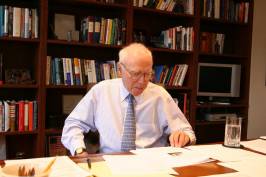Contrary to his well known prominent financial career and his role in preventing the bankruptcy of New York City in the 1970s, Felix Rohatyn’s childhood experiences during the Holocaust in France are virtually unknown.
Rohatyn remembered some wonderful anecdotes during a meeting with the International Raoul Wallenberg Foundation (IRWF) intended to videotape his testimony. He recalled the time when a German officer failed to take a good look at their papers because he was lighting a cigarette and when he used to hide gold coins inside the toothpaste tubes. Still, how his step-father got the visas that would allow the family to escape from France, as well as the identity of the diplomat who provided them with the papers, has been a mystery to him until recently.
Among the many documents from the Brazilian State Department (Itamaraty) and the Brazilian National Archives that historian Fabio Koifman uncovered when researching the life and deeds of diplomat Luiz Martinz de Souza Dantas for his book ”Quixote nas Trevas,” a list of the people who benefit from Dantas’ visas was discovered. Felix Rohatyn was one of them.
When the Wallenberg Foundation approached Rohatyn with the information a few years ago, he was astounded, ”I waited 50 years of my life to know how I got my Visa and now I know.” ”We were terribly grateful. I know that he took personal danger because Vargas was not a great fan of the Jews. These people were taking risks and Souza Dantas suffered a lot,” said Rohatyn after learning about Souza Dantas role in his survival.
Dantas granted diplomatic visas to enter Brazil to hundreds of people who, from the point of view of the Brazilian immigration policy, were considered undesirable. An investigation opened by the administrative department of the public service headed by Vargas accused Dantas of granting irregular visas. In an Itamaraty telegram, the diplomat affirmed in his defense that he did not grant ”even a visa” after the prohibition. It was a lie. Dantas’ lack of fear was proven by evidence of visas issued in January 1941 -a month after the prohibition- but with false information. With his actions, Dantas saved about 800 people from extermination.
Armed with Dantas’ visas, Rohatyn and his family crossed the Atlantic en route to Brazil. Yet the country was against Jewish immigration and Rohatyn’s family decided it would be better to move to the US. After the war, Rohatyn’s family went back to France, but he decided to attend college in the US. After spending some time in the army and the Korean War, Rohatyn graduated from school and started to look for a job, ”my stepfather knew Andrew Meyer who was a senior partner of Lazard Frères and said, ‘Listen I have a step son and he’s not very bright, but could you give him a job for a year or something?’”
The rest of the story is well known. Rohatyn went to work at Lazard in New York and worked there for forty years. Still, he is aware that none of his would have been possible without the Brazilian visas issued by Dantas, ”If I haven’t got those Visas I would have seen the gas chamber in Auschwitz,” he concludes.

